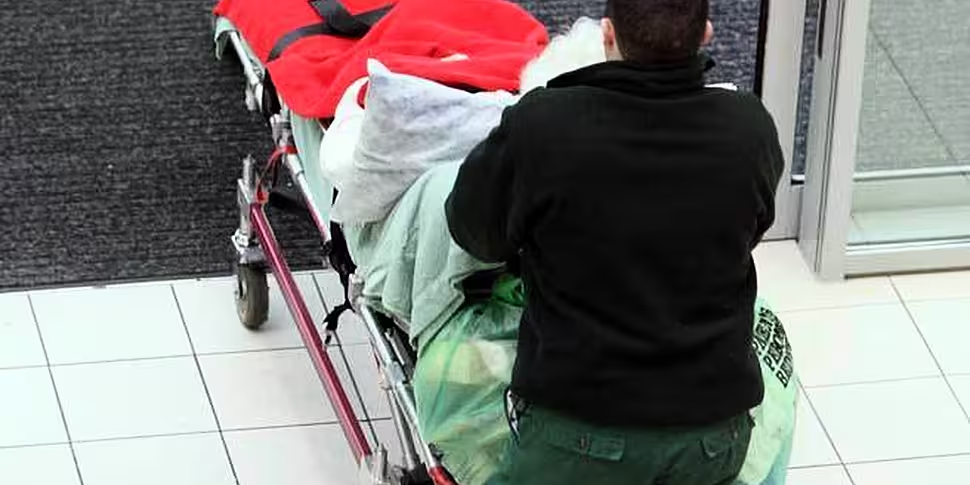Updated 17:05
The union representing Irish nurses has called on the government to declare the overcrowding in Irish hospitals a 'national emergency' - as the latest figures reveal a sharp increase in the number of patients waiting on trolleys and wards across the country.
According the Irish Nurses and Midwives Organisation (INMO) there were 527 people waiting on a bed this afternoon - up from 417 yesterday.
The number is down from the record count of 612 on January 3rd.
David Hughes, Deputy General Secretary of the INMO told Newstalk the numbers are “unacceptably high” and warned that they are leading to a “very unsafe working environment for nurses, doctors and patients in those emergency departments.”
He said there is a cyclical pattern to emergency department overcrowding with numbers peaking midweek and warned “it will probably be worse tomorrow.”
National emergency
“For every patient that is involved in this it is a national emergency,” said Mr Hughes. “These numbers are far too high and they represent a terrible diminution of the health service.”
“The government have a tolerance for this and - because there is no major consistent public outcry - it will be tolerated.
“It has been tolerated for well over a decade now and although it is worse now than it ever was - this present government falls shy of saying it is a national emergency.”
INMO Trolley/Ward Watch 17/01/17
527 Patients
372 on trolleys
155 on wards #trolleywatch https://t.co/NmpGN2LjpA pic.twitter.com/BWUr6oCT3j— INMO_IRL (@INMO_IRL) January 17, 2017
Letterkenny General Hospital in Donegal was the most overcrowded in the country this afternoon with 38 patients waiting for a bed.
Our Lady of Lourdes Hospital in Drogheda is facing the second highest level of overcrowding at 35.
There are 34 patients are without a bed in Mullingar - with hospital management asking members of the public to go to a GP before attending the hospital if possible.
A statement from the facility said: “Regional Hospital Mullingar is continuing to experience increasing pressures on its Emergency Department and are asking the public to contact their GP or MiDoc in the first instance where possible.”
The Mater Misericordiae University Hospital is the facing the worst overcrowding in the Eastern Division with 29 people currently on trolleys.
Recruitment and retention industrial action
Following a meeting of the INMO national executive this afternoon, the union deferred a decision on industrial action until they receive written proposals from the government and HSE on how to address the staff recruitment and retention crisis.
The executive will hold a special meeting on Monday January 30th to make a decision on whether to announce a campaign of industrial action - which would include a "mixture of individual days of strike action, augmented by a continuous work to rule."

INMO President Martina Harkin-Kelly, 06-10-2016. Image: Sam Boal/RollingNews
The union has already received a 90% mandate from its members to take action unless management can put forward “substantial proposals, to address the staffing, recruitment and retention crisis.”
“This is the last chance for health service management to demonstrate they understand the extent of the problem and come forward with concrete proposals [...] which will begin resolving this deepening crisis,” said INMO president Martina Harkin-Kelly.
“Management must clearly understand that the decision of my executive council today provides them with two weeks within which to demonstrate, after years of neglect and disrespect, that they are now committed to recognising that patient care is being compromised, nurses/midwives are completely overworked and their health and safety is being neglected.”
“Lethargic” government reaction
Mr Hughes said the INMO believes the government and HSE have been “lethargic” in reacting to the crisis and warned that, “they need to do an awful lot more to make it a better experience for patients - and a safer experience.”
He said the general feeling amongst INMO members is “one of frustration and extremely low morale.”
“They are working extremely long hours often without breaks, under extreme pressure and most nurses when they come off their shift - they are relieved to have got through the day safely,” he said.
He said many go home every night facing sleepness nights worrying about what they have left behind.
The Department of Health and the HSE have been contacted for comment.









